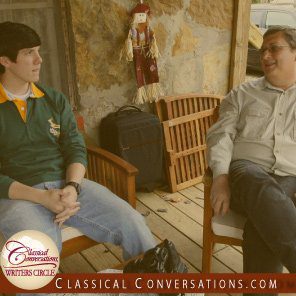Feeling guilty seems to be a permanent condition of motherhood. It is often magnified for homeschooling mothers: it seems impossible to finish the “perfect” lesson plans we have made; if we participate in too many activities, we worry that we are overloading our children… if we do not participate in enough activities, we worry that we are ruining their social skills. One pervasive fear is that we are not spending quality instruction time with each child: if we spend a lot of time with our oldest, we may never get the youngest child reading and writing… if we spend too much time with the youngest, the oldest will not be prepared for high school and college.
I am homeschooling children from age four to thirteen. It is a constant juggling act. Early on in the year, I spent more time with my eldest, as Ben encountered challenges in Algebra I. Now, he is back to self-study, with the occasional question. The same proved true in Formal Logic. Ben needed assistance with this new—and often strange—subject, but he has now found his “logic legs.” My current goal is to spend quality time with him discussing issues, particularly in current events, debate, literature, and theology.
I usually homeschool my three daughters downstairs. I tutor them in math, Latin, history, science, Foundations memory work, and language arts. Ben works upstairs, preparing for Challenge B. Strengthened by study habits acquired in Challenge A, Ben rewrites Mock Trial witness statements, works through math lessons, reads short stories, adds to the story he is composing, and completes Latin and logic exercises. At the end of the day, he shows me his work and asks questions.
In the middle of this year, we added something new to our routine: I scheduled a weekly meeting with Ben. The day before our community meets, I reserve two to three hours alone with him. It has become our favorite time together. He catches me up on Latin, logic, and Mock Trial. We discuss the short story he has read for the week, using the thought questions from Words Aptly Spoken Short Stories. If I did not finish the reading myself, we still have a profitable discussion. (If you have a child in Challenge and are not able to keep up with the reading, make time to discuss the literature with him or her anyway. Use the thought questions in WAS to stimulate discussion. These conversations allow us to discover what our young adults are thinking about important issues, and we can guide them toward truth, goodness, beauty, and wisdom.)
Ben and I also work through Defeating Darwinism together. I have two goals for him: (1) He practices the rhetorical skill of reading aloud well. He has recently begun competing in team policy debate, and needs opportunities to practice important public speaking skills like clear enunciation, voice volume, expression, and proper pronunciation of new words. (2) He strives to comprehend the important issue of apologetics, of defending his faith. So far, we have encountered several significant ideas: whether or not gene mutations can be beneficial; if Darwinian evolution adequately explains complex microbiological processes; how to dispute the media stereotype of “Christian fundamentalists”; and how to spot when a text or a debate shifts the terms from macroevolution to microevolution.
I confess, I did not read the first chapter with Ben. Instead, I asked him to summarize what he had learned. I then realized that he had not adequately understood this somewhat difficult text. As we read together, we now stop after every paragraph to discuss confusing terms and define new words (this book has immensely broadened Ben’s vocabulary!). We often read in the evening. Ben’s dad chimes in with recent news stories he has read. We sometimes watch debates between Christians and atheists and relate those conversations to the book. Ben enjoys the time alone with mom and dad, discussing new ideas which are coming thick and fast each day; he seems freer with his questions when we are alone with him.
Nurture your students. Set aside two to three hours each week to have great conversations. Even if you cannot always stay caught up, pick a few key areas and make time for discussion. Your children will realize how much you love them and value their ideas, and you will learn much from one another during these precious moments. You will discover they are the best hours of the week.




